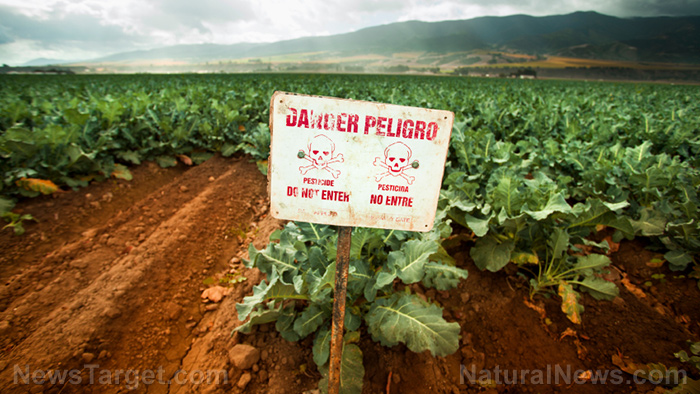Controversial Georgia bill grants immunity to pesticide makers as cancer lawsuits mount
04/28/2025 / By Cassie B.

- Georgia has passed SB 144, a bill shielding pesticide makers like Bayer from lawsuits over cancer-linked products like Roundup if labels meet federal standards.
- Governor Brian Kemp must decide whether to sign the bill, which critics say prioritizes corporate interests over public safety, following a $2.1 billion verdict against Bayer.
- Science shows glyphosate is carcinogenic and harms the environment.
- Small farmers and lawmakers warn the bill removes accountability, leaving victims with no legal recourse against harmful products.
- If signed, SB 144 could set a national precedent, enabling chemical companies to avoid liability while risking public health.
In a horrifying move that prioritizes corporate profits over public health, Georgia’s legislature has passed SB 144, a bill designed to shield pesticide manufacturers like Bayer, the maker of cancer-linked Roundup, from lawsuits filed by victims claiming inadequate safety warnings.
The bill, now awaiting Governor Brian Kemp’s signature, would grant legal immunity to chemical companies as long as their product labels meet federal EPA standards, effectively silencing victims and overriding state-level health protections.
The timing couldn’t be more outrageous. Just weeks ago, a Georgia jury ordered Bayer to pay $2.1 billion to a man who developed cancer after using Roundup in a verdict the company dismissively called a “conflict” with regulatory “consensus.” Since acquiring Monsanto in 2018, Bayer has faced a tidal wave of lawsuits, settling nearly 100,000 claims for $11 billion while still battling 67,000 active cases. Critics argue SB 144 is a blatant attempt to shut down future litigation, leaving Georgians with no recourse when corporations sell harmful products.
A bill written by industry, for industry
The bill’s supporters—mostly Republican lawmakers and agrochemical lobbyists—claim it’s about protecting farmers who rely on pesticides like glyphosate, Roundup’s key ingredient. Rep. Steven Meeks (R), a vocal backer, insists the EPA’s regulations are the most rigorous in the world, arguing that without the bill, farmers might lose access to critical tools. But opponents see through the spin.
“This bill is not about farmers—this bill is about Bayer,” fired back Rep. Stacey Evans (D) during debates. “Roundup causes cancer – that is not a debate anymore. A lot of people got sick… and now Bayer wants to ask us to take (liability) away.”
Meanwhile, small farmers like Will Harris of White Oak Pastures, a sustainable Georgia farm, are pleading with Kemp to veto the bill. In a scathing letter, Harris called out the deception: “Pesticide companies have no incentive to be honest about the risks of their products.”
The EPA’s flawed shield
The heart of SB 144 rests on a dangerous premise: that EPA approval equals safety. But the EPA has repeatedly failed to keep pace with independent science. The World Health Organization’s International Agency for Research on Cancer classified glyphosate as “probably carcinogenic” in 2015, yet the EPA still refuses to mandate cancer warnings. Even the NIH warns glyphosate persists in the environment, contaminates water, and may damage the nervous system.
A crossroads for Kemp
Governor Kemp now faces a defining choice: Side with multinational corporations or Georgia’s families. Bayer’s lobbying playbook is clear; after similar bills stalled in Iowa and Idaho, Georgia is their test case. If signed, other states could follow, creating a corporate free-for-all where profits trump safety.
The stakes couldn’t be higher. With $16 billion already spent on Roundup settlements, Bayer is desperate to shut down lawsuits. But as victims continue to suffer and juries keep delivering massive verdicts, SB 144 represents a grotesque overreach.
Kemp must veto this corporate handout. Farmers deserve honest labeling. Consumers deserve the right to sue when harmed. And Georgia must not become the model for stripping away protections nationwide. The health of millions hangs in the balance.
If Kemp signs SB 144, it won’t just be a win for Bayer; it will be a green light for chemical companies to hide risks, ignore science, and laugh all the way to the bank while ordinary Georgians pay the price.
Sources for this article include:
Submit a correction >>
Tagged Under:
Bayer, big government, chemical violence, dangerous precedent, environ, food supply, Georgia, lawsuits, Monsanto, outrage, Public Health, toxins
This article may contain statements that reflect the opinion of the author





















